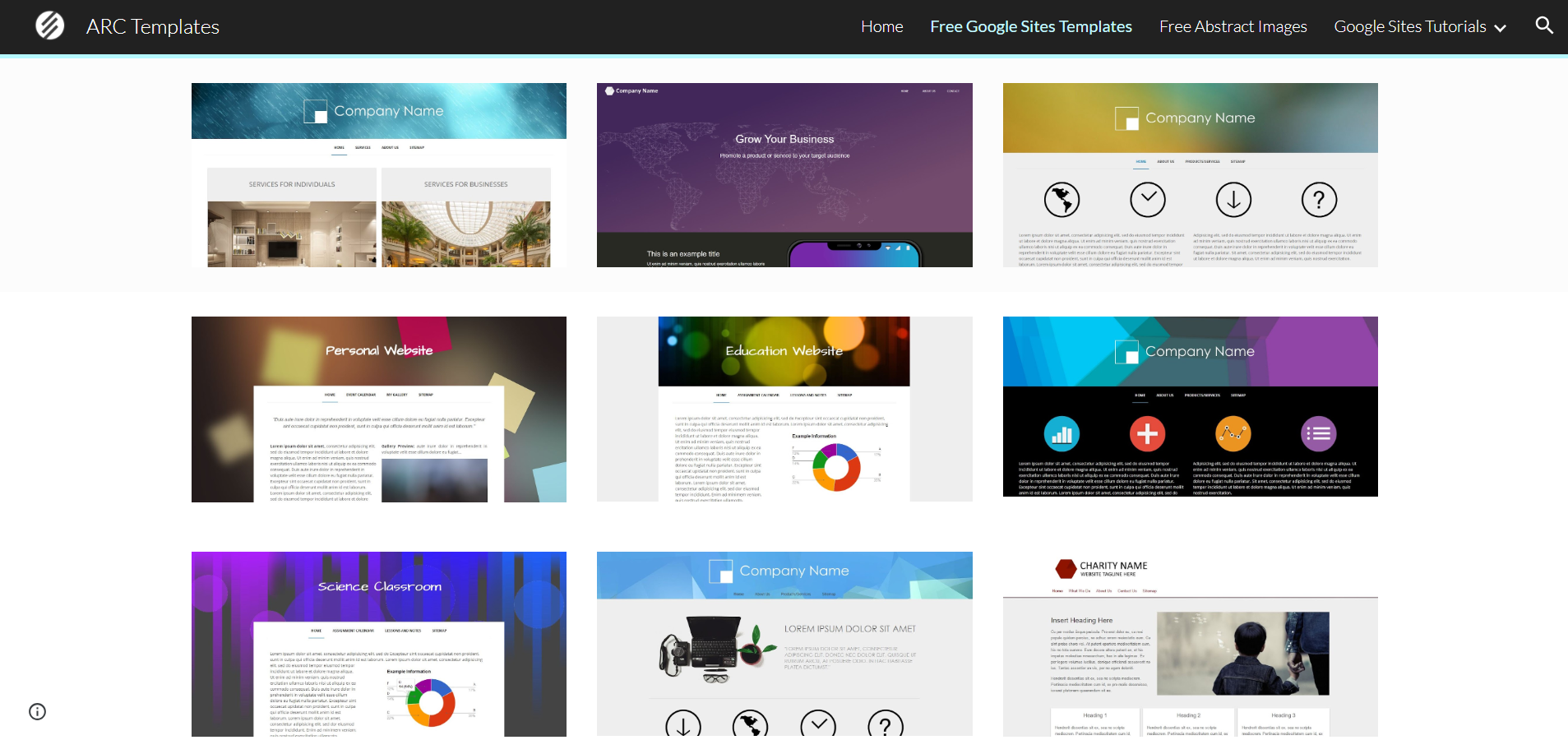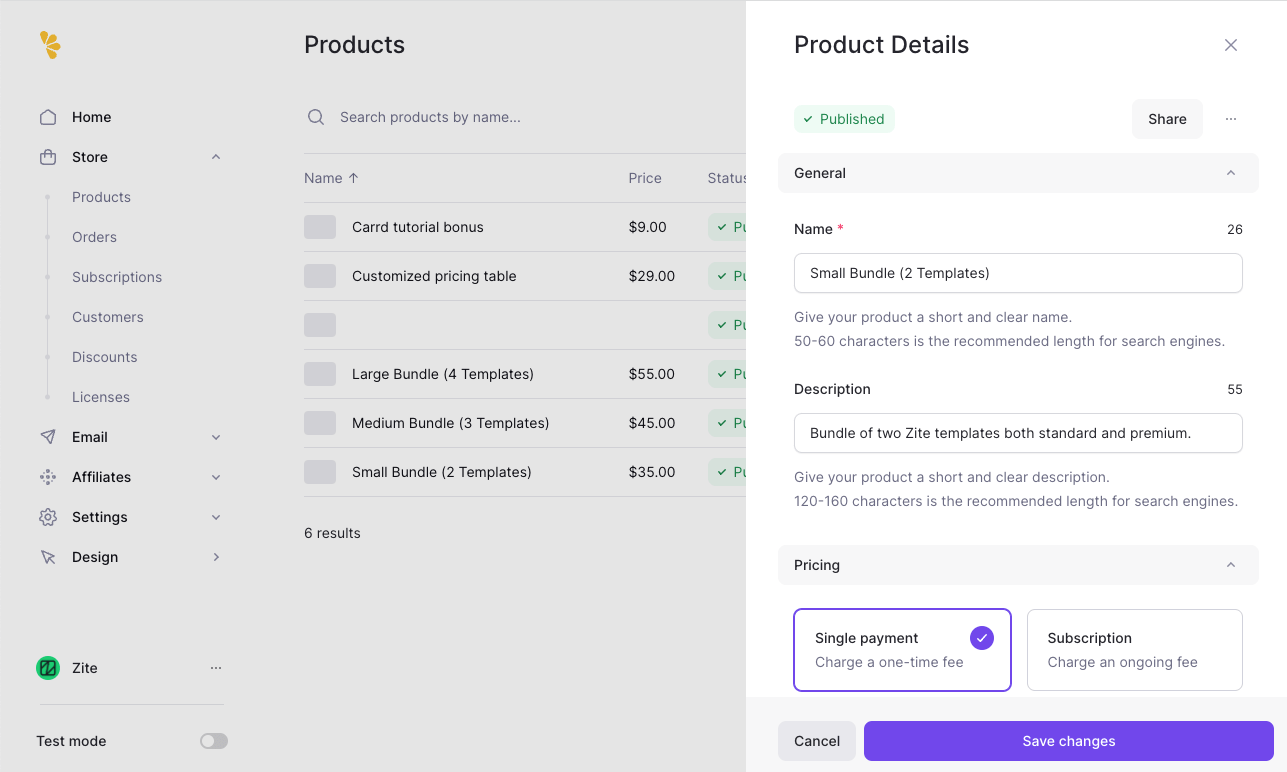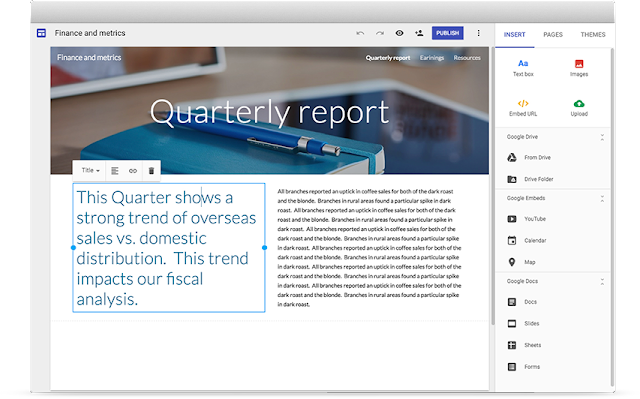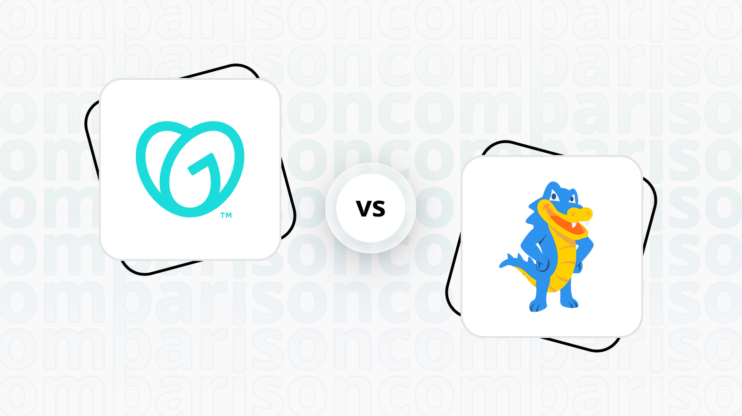In the Google Sites vs Carrd comparison, there are several things to consider. It’s important to consider the type of website you’re looking to build. Google Sites is ideal in team collaboration and integrates easily with Google’s ecosystem, making it a strong choice for group projects, professional portfolios, and informational websites. Carrd, in its turn, stands out for its simplicity, affordability, and flexibility, particularly for creating visually appealing single-page websites. Let’s understand the important comparison features in detail.
Google Sites vs Carrd: Final verdict
Google Sites and Carrd each have their own unique advantages, but they are designed to meet different user needs and preferences.
Google Sites (Overall Grade: 5.6/10)
is ideal for users looking for a collaborative platform that integrates effortlessly with other Google services. It is great at user management, security, and hosting quality, making it ideal for team projects, personal portfolios, and small business websites. However, its limited design features and lack of ecommerce capabilities may make it less attractive for those with more complex website requirements.
Carrd (Overall Grade: 6.1/10)
stands out for its simplicity, ease of use, and affordability. It is perfect for quickly and efficiently creating fully responsive, single-page websites. Carrd offers a wider variety of templates and better design customization options compared to Google Sites. While not primarily built for ecommerce, it supports basic ecommerce functionalities through third-party integrations, making it a versatile option for personal profiles, landing pages, and small business websites.

|

|
|
|---|---|---|
Design functionalities & templates |
4.9 |
7.5 |
Ease of use |
8.3 |
9.0 |
Ecommerce |
1.8 |
3.5 |
Website Editors |
7.0 |
7.0 |
Product testing options |
6.9 |
6.0 |
Price |
8.1 |
8.9 |
Hosting quality |
8.2 |
5.0 |
Website speed optimization |
3.3 |
8.2 |
Plugins and integrations |
6.4 |
5.8 |
Marketing features |
2.6 |
5.8 |
Customer support |
7.2 |
6.2 |
Security |
9.3 |
7.6 |
AI capabilities |
0 |
0.0 |
User Management |
7.8 |
4.3 |
Which one is the best for ecommerce: Google Sites or Carrd?
 1.8
1.8
 3.5
3.5
Verdict
: Google Sites and Carrd are not primarily designed for ecommerce, but Carrd offers more options and functions for small-scale online stores.
Google Sites
: Google Sites lacks built-in ecommerce features, requiring users to rely on third-party integrations for functionalities like embedding payment buttons or linking to external platforms. This makes it less suitable for those wanting to set up an online store quickly and efficiently.
Carrd
: Carrd offers basic ecommerce functionalities, including integration with payment platforms like Stripe and PayPal. It provides a selection of ecommerce templates and supports simple product listings. While not as feature-rich as dedicated ecommerce platforms, Carrd is a more suitable option for small-scale ecommerce needs compared to Google Sites.
Which one is the best for informational and business websites?
 7.2
7.2
 7.9
7.9
Verdict
: For creating informational and business websites, Carrd outperforms Google Sites with a score of 7.9 compared to Google Sites’ 7.2. Carrd’s simplicity, ease of use, and design flexibility make it an excellent option for those looking to quickly and efficiently build visually appealing, single-page websites.
Google Sites
: Google Sites is a strong tool for creating structured web pages, especially for team projects and small business websites. Its integration with other Google services and collaborative features make it a popular choice for users who need to work together on a site. However, its design and customization options are somewhat limited compared to Carrd, limiting the user’s creative control.
Carrd
: Carrd offers a simple platform for creating fully responsive, single-page websites. With a wide range of templates and customization options, it meets various needs, from personal profiles to business landing pages. Carrd’s user-friendly interface and affordable pricing plans make it a great option for individuals and small businesses looking to establish an online presence quickly. In comparison, Carrd’s design flexibility and ease of use make it the preferred choice for informational and business websites.
Google Sites vs Carrd: Detailed comparison
Design functionalities & templates
Design FunctionalitiesRepresents how well each platform allows for creative design and customization of websites.Score Components:
- Template Variety (30%): Range and quality of design templates.
- Customization (30%): Flexibility and options for design alterations.
- User Interface (20%): Ease and intuitiveness of the design process.
- Responsiveness (10%): Adaptability to different devices and screen sizes.
- Innovation (10%): Unique design features and tools.
 4.9
4.9
 7.5
7.5
🏆
Winner: Carrd.
Carrd offers diverse templates and designs, more customization flexibility, and more creative design possibilities than Google Sites.
Google Sites provides a limited selection of templates for various purposes, from personal blogs to business websites. These templates focus on user engagement, simplicity, and functionality, with some customization options to meet specific needs. However, compared to Carrd, Google Sites’s design customization is limited and less flexible.


In comparison, Carrd provides a large templates and design selection to meet various needs and preferences. Users can select from a broad array of themes, from simple and minimalist to more complex and dynamic layouts, giving something for everyone. The platform regularly updates its template library with fresh designs, staying aligned with the latest web design trends.


Get a head start on website creation with AI
Create a custom website tailored to your business needs 10X faster with 10Web AI Website Builder!
Ease of use
Ease of useReflects the platform’s overall user-friendliness.Score
Components:
- Learning curve (40%): Quickness and ease of getting started.
- Interface design (30%): Simplicity and intuitiveness of layout.
- User guidance (20%): Quality of tutorials and support.
- Flexibility (10%): Adaptability to various user skills.
 8.3
8.3
 9.0
9.0
🏆 Winner: Carrd
. With a score of 9.0, Carrd is designed for simplicity and ease of use. It’s a perfect choice for beginners and those who want to create single-page websites quickly. Google Sites, scoring 8.3, offers a user-friendly interface and integrates easily with other Google services, but it may lack advanced features desired by more experienced web developers.
Learning Resources
🏆 Winner: Google Sites
. Google Sites’s learning resources range from practical guides for educators to inclusive digital skill development programs for the wider public. Carrd also offers a range of tutorials and documentation, but Google Sites’ resources are broader.
For ecommerce
EcommerceMeasures the platform’s effectiveness in supporting online business activities.Score Components:
- Ecommerce themes and templates (20%): Variety and design of templates.
- Product management (25%): Ease of managing and organizing products.
- Payment options (25%): Variety and convenience of payment methods.
- Ecommerce features (20%): Features for managing an ecommerce store.
- Integration (10%): Compatibility with external e-commerce tools and services.
 1.8
1.8
 3.5
3.5
In the case of ecommerce, both Google Sites and Carrd are not primarily designed for this purpose. However, they offer some features through third-party integrations.
Google Sites does not have built-in ecommerce features, but users can add ecommerce functionality by embedding third-party tools or widgets, linking to external ecommerce platforms, or using buttons that connect to payment processors. For example, Google Forms can be used for order forms, and services like PayPal can handle transactions. To create a full-functional ecommerce platform with Google Sites, you’ll need to rely on these external integrations or services.
 |
 |
|
|---|---|---|
Ecommerce themes and templates |
0.0 |
4.5 |
Product page customization |
0.0 |
3.0 |
Payment processing and commissions |
1.0 |
5.0 |
POS capabilities |
0.0 |
0.0 |
Payment gateways |
2.0 |
5.5 |
Product numbers |
0.0 |
2.0 |
Additional ecommerce features |
0.5 |
3.5 |
Google Sites ecommerce features:
Google Sites itself does not have built-in ecommerce features.
However, Carrd gives basic product listing options and integrates with payment platforms like Stripe and Paypal. It also offers a selection of ecommerce templates. Carrd is primarily designed as a simple, lightweight platform for building one-page websites and does not come with strong ecommerce features out of the box. Users looking to add more full-scale ecommerce functionality should use third-party services or link to external platforms like Etsy or Shopify.
Carrd ecommerce features:
- Paypal and Stripe Integration
- External Widgets integrations
- Basic Product Listing options

Ecommerce themes & templates
Google Sites does not offer any ecommerce templates. In contrast, Carrd provides 14 ecommerce templates for users looking to quickly launch online stores. These templates are designed with simplicity and conversion optimization in mind, featuring a range of styles from dark themes to minimalist aesthetics. They are priced at $19 or $25, depending on the template, and require a Pro Standard account or higher to access advanced elements and widgets.
Product page customization
Google Sites does not have product page customization features, as products can only be listed by embedding third-party platforms. In this case, all customization is handled within those platforms.
In contrast, Carrd offers a more efficient approach to product page customization. It has integrations with third-party platforms like Stripe, Lemon Squeezy, and Gumroad. Users can create product pages in Carrd by adding details such as the product name, description, image, and price, then integrate a checkout button using Carrd’s Widget element for platforms like Stripe.
Payment processing
Payment gateways can be integrated into Google Sites using external tools or links, rather than built-in features. This can be done by embedding HTML code for payment buttons from services like PayPal, Square, or Stripe, or by linking to an external checkout page. Third-party ecommerce widgets also provide an option for adding payment functionality. That said, Google Sites does not have the complete ecommerce features that dedicated platforms offer.
Carrd allows Pro Plus users and above to create payment-enabled forms. It integrates with Stripe Checkout for processing payments. This feature supports many transactions, such as order forms or paid email lists. Users can configure payments through Stripe, either by setting a fixed price or using a custom amount, and must enter Stripe API keys to complete the setup. Carrd does not mention charging commissions or offering POS capabilities in its documentation. For payment gateways, it specifically supports Stripe and PayPal.
Website Editors
Website EditorsEvaluates the platforms’ website building and editing capabilities.Score Components:
- Customization tools (40%): Range and power of editing features.
- Editor usability (30%): User experience within the editor.
- Design flexibility (20%): Freedom in layout and design changes.
- Update and maintenance ease (10%): Simplicity of updating and maintaining the site.
 7.0
7.0
 7.0
7.0
🏆
Winner: Tie
. Both Google Sites and Carrd earned a score of 7.0 for their website editors, each providing distinct advantages.

Google Sites’s a user-friendly website builder allows users to create and design websites. Its drag-and-drop interface allows you to add, customize, and arrange elements such as text, images, and videos on web pages effortlessly. The tool also has many templates and design options to help users get started quickly and create professional-looking sites. Since Google Sites integrates with other Google services, you can easily include Google Docs, Sheets, Slides, and Maps into the website.

Carrd’s website builder editor is designed for simplicity and efficiency, primarily for users who want to create single-page websites. It features a user-friendly interface with drag-and-drop functionality, making it easy to add, customize, and position elements like text, images, buttons, and forms. The editor also offers a variety of pre-designed templates and responsive design options for websites to look professional and perform well across devices. Carrd also includes basic SEO tools and integrates with external services. It’s an excellent choice for personal projects, portfolios, and small business landing pages.
Mobile editor/app
 0
0
 5.5
5.5
🏆
Winner: Carrd
. Neither Google Sites nor Carrd offers a dedicated mobile editor app. However, Carrd allows users to edit their websites on a mobile browser, which gives it an edge over Google Sites. This feature can be useful for people who need to make quick changes on the go.
As mentioned, Google Sites does not support mobile editing, which can be a significant drawback for users who prefer to work on their websites from a mobile device.
Carrd wins in this category due to its mobile browser editing capability.
Product testing options
Product Testing OptionsAssesses the options for trying out platform features before commitment.Score Components:
- Trial quality (40%): Extent and usefulness of the trial or free version.
- Feature accessibility (30%): How many features are available to test.
- Trial duration (20%): Length of the trial period.
- Ease of transition (10%): Smoothness of moving from trial to paid plans.
 6.9
6.9
 6.0
6.0
Overall Result
:
Google Sites wins
. Google Sites scores 6.9 in product testing options, slightly higher than Carrd’s 6.0. Google Sites offers a free version and a 14-day trial period during which some premium features can be tested. Carrd, in contrast, does not offer a free version but provides a 7-day trial period for testing premium features. Neither platform offers a money-back guarantee.
 |
 |
|
|---|---|---|
Free Plan |
Yes |
No |
Trial Duration |
14 days |
7 days |
Testing Premium Features |
Some features during free trial | All features during free trial |
Money Back Guarantee |
No | No |
Price
PriceLooks at the cost-effectiveness and value for money of each platform.Score Components:
- Plan value (40%): What each pricing tier offers.
- Transparency and clarity (30%): Clearness of pricing structures.
- Flexibility of plans (20%): Range of options to suit different budgets.
- Hidden costs (10%): Additional expenses not included in the plan.
 8.1
8.1
 8.9
8.9
Carrd’s pricing plans are more budget-friendly compared to Google Sites. Thus, it becomes a great choice for individuals and small businesses. However, Google Sites offers more advanced features and greater scalability, which make it a stronger option for larger organizations.

|

|
|
|---|---|---|
$0-$1 |
No offering at this amount. |
Pro Lite ($0.75/month): Basic features suitable for simple, personal websites. Up to 3 1-page websites. Value for price: 6.0 |
$1-$3 |
No offering at this amount. |
Pro Standard ($1.58/month): Offers more features and flexibility, ideal for professional profiles and small projects. Up to 10 1-page websites. Value for price: 7.5 |
$3-$10 |
Business Starter ($7.20/month): This plan includes basic features suitable for individuals or small businesses, offering professional email through Gmail, 30GB of storage per user, and video meetings for up to 100 participants. It allows to manage 1 website and there is no limitation on number of pages. Value for price: 6.0 |
Pro Plus ($4.08/month): Enhanced features for more complex sites, including additional customization options. Up to 25 1-page websites. Value for price: 8.5 |
$10-$20 |
Business Standard ($14.40/month): Suitable for growing businesses, this plan provides 2 TB of storage per user, video meeting capacity for up to 150 participants with recording features, and access to smart booking pages and shared drives. It allows to manage 1 website and there is no limitation on number of pages. Value for price: 7.5 |
No offering at this amount. |
$20+ |
Business Plus ($21.60/month): Designed for larger businesses needing more robust capabilities, offering 5 TB of storage per user, advanced security options, and video meetings for up to 500 participants. It allows to manage 1 website and there is no limitation on number of pages. Value for price: 8.5 |
No offering at this amount. |
websites.
Hosting quality
Hosting
qualityExamines the reliability and performance of the hosting solutions.Score Components:
- Uptime (40%): Consistency and reliability of website availability.
- Speed (30%): Loading times and performance.
- Bandwidth and storage (20%): Sufficiency of resources provided.
- Data centers (10%): Quality and distribution of hosting infrastructure.
 8.2
8.2
 5.0
5.0
🏆
Winner: Google Sites
Google Sites offers cloud-based managed hosting with a 99.9% uptime guarantee. It operates 21 data centers globally. It means the hosting service is fast and strong. Carrd, in contrast, offers shared hosting but does not provide any statistics on uptime or information about its data centers, making Google Sites the clear winner in this category.
 |
 |
|
|---|---|---|
Do they offer hosting? |
Yes, basic storage with 100MB free per site, can be increased by upgrading to Google Workspace |
Yes, shared hosting integrated with its website-building platform |
Data Centers: |
Google operates a total of 21 data centers across the globe: 2 in Asia, 5 in Europe, 13 in US and 1 in South America |
Carrd doesn’t publicly disclose any information about its data centers |
Type of hosting: |
Cloud based managed hosting |
Shared Hosting |
Uptime: |
99.9% |
Carrd.co does not provide any statistics on uptime |
Uptime Guarantee: |
Yes, 99.9% |
No |
Website Speed Optimization
Website Speed OptimizationEvaluates optimization of website loading timesScore Components:
- PageSpeed Score (30%): Google’s score indicating performance optimization.
- Loading Time (30%): The average time until a website is fully interactive.
- Mobile Optimization (15%): Optimization effectiveness for mobile devices.
- Resource Optimization (15%): Optimizing images, scripts, and other heavy resources.
- CDN Usage (10%): Use of CDN to enhance speed across geolocations.
 3.3
3.3
 8.2
8.2
🏆 Winner: Carrd
Both Google Sites and Carrd focus on website performance and page speed, but Carrd wins with its simple, single-page design that minimizes load times and speeds up the page.
 |
 |
|
|---|---|---|
Focus |
Automated Optimization, CDN, Mobile Optimization, Browser Caching, Code Minification, Use of AMP |
Mobile Responsive design, Caching, Cloudflare CDN |
Performance Tools |
Google Lighthouse, PageSpeed Insights |
Google PageSpeed Insights Integration |
Key Strategies |
Automated Optimization, CDN, Mobile Optimization, Browser Caching, Code Minification, Use of AMP |
Mobile Responsive design, Caching, Cloudflare CDN |
Load Times |
Google does not disclose statistics about website Page Speed scores, or load times |
Given that websites built with Carrd are fairly simple, load times are expected to be minimal, and page speed scores are expected to be high |
Core Web Vitals Improvement |
Emphasis on LCP, FID, CLS improvements |
Carrd does not disclose any information related to Core web vitals improvements |
Carrd, with its focus on simplicity and ease of use, guarantees minimal load times and high page speed. It uses mobile responsive design, caching, and Cloudflare CDN as its key strategies for speed optimization. However, Carrd does not disclose any information related to Core Web Vitals improvements.
Google Sites uses automated optimization, CDN, mobile optimization, browser caching, code minification, and the use of AMP as its key strategies for speed optimization. It also emphasizes on LCP, FID, CLS improvements for Core Web Vitals. In its turn, Google does not disclose statistics about website Page Speed scores or load times.
Get a head start on website creation with AI
Create a custom website tailored to your business needs 10X faster with 10Web AI Website Builder!
Plugins and integrations
Plugins and integrationsMeasures the range and effectiveness of additional plugins and integrations.Score Components:
- Variety of options (40%): Range of available add-ons.
- Integration smoothness (30%): Ease of integrating plugins into the site.
- Quality of plugins (20%): Functionality and reliability of the options.
- Custom integration capabilities (10%): Support for custom or third-party integrations.
 6.4
6.4
 5.8
5.8
🏆 Winner: Google Sites.
Google Sites scores 6.4, offering a broad selection of plugins and extensions to enhance website functionality. It integrates with various Google services and third-party platforms like Elfsight and Common Ninja. The integrations provide features such as social media feeds, review displays, chat support, ecommerce tools, and interactive widgets. Carrd, with a score of 5.8, also offers a range of plugins and extensions, both free and paid, but falls behind in terms of the variety and depth of functionalities available.

Marketing Features
Design FunctionalitiesRepresents how well each platform allows for creative design and customization of websites.Score Components:
- Template Variety (30%): Range and quality of design templates.
- Customization (30%): Flexibility and options for design alterations.
- User Interface (20%): Ease and intuitiveness of the design process.
- Responsiveness (10%): Adaptability to different devices and screen sizes.
- Innovation (10%): Unique design features and tools.
 2.6
2.6
 5.8
5.8
🏆
Overall Winner: Carrd
. Carrd has many more marketing features, including SEO tools, email marketing via third-party integrations, blogging, social media integration, analytics and reporting, as well as support for ads and promotions. In contrast, Google Sites offers basic SEO settings and Google Analytics integration but does not have email marketing, blogging, and ads and promotions functionalities.
 |
 |
|
|---|---|---|
SEO Tools |
Basic SEO settings |
Yes |
Email Marketing |
No |
Yes, through third party integrations |
Blogging |
No |
Yes |
Social Media Integration |
Yes, manual embedding of social media links and widgets |
Yes |
Analytics and Reporting |
Google Analytics integration |
Google Analytics integration |
Ads and Promotions |
No |
Yes, through third party integrations |
Customer Support
Customer supportEvaluates the quality and availability of support options.Score Components:
- Response time (40%): Speed of support responses.
- Support quality (30%): Effectiveness and helpfulness of the support.
- Availability (20%): Range of support channels (phone, chat, email).
- Resource richness (10%): Quality of self-help and educational materials.
 7.2
7.2
 6.2
6.2
🏆 Winner: Google Sites
. In the comparison of Google Sites vs Carrd, Google Sites wins with a customer support score of 7.2. Google Sites offers many forms of support options, including a Help Center, community forums, and direct support for Google Workspace customers. Enterprise users benefit from 24/7 phone and email support.
Carrd provides 24/7 email support with a typical response time of 24 hours. While this is sufficient for many users, Carrd, with a score of 6.2, does not have the inclusive support options and enterprise-level support that Google Sites offers.
Security
SecurityLooks at the platforms’ security measures and data protection.Score Components:
- Data protection (40%): Safeguards for user and customer data.
- SSL and encryption (30%): Implementation of secure connections.
- Compliance (20%): Adherence to industry security standards.
- Regular updates (10%): Frequency of security updates and patches.
 9.3
9.3
 7.6
7.6
🏆
Winner: Google Sites
. Google Sites, with a security score of 9.3, offers important security measures including SSL encryption, two-factor authentication, and automatic malware scanning. It also benefits from Google’s regular security updates and compliance with international data protection standards. Google Workspace offers private data storage and protection through data encryption in transit and at rest, strict access controls. It also follows international data protection regulations like GDPR.
Although it may not offer the same security level as Google Sites, Carrd, with a security score of 7.6, also guarantees website security. It automatically enables SSL for all sites. Carrd collects personal information and uses cookies for website operation, data gathering, and improving user experiences. It takes measures to protect personal information online and offline.
AI Capabilities
AI capabilitiesMeasures the effectiveness of AI-driven features and tools.Score Components:
- Automation efficiency (40%): Impact of AI on streamlining processes.
- Personalization (30%): AI-driven customization for users or customers.
- AI-Assisted design (20%): Role of AI in website design and functionality.
- Data analysis (10%): Use of AI in interpreting user data and analytics.
 0
0
 0.0
0.0
 |
 |
|
|---|---|---|
AI Builder |
||
AI Ecommerce features |
||
AI Content Generation |
||
Additional AI features |
🏆 Winner: Tie
. Neither Google Sites nor Carrd offers AI capabilities. Both platforms focus on providing a simple, user-friendly interface for building websites, but do not incorporate AI tools or features into their platforms.
User Management
User ManagementAssesses the platforms’ capabilities in managing user roles, permissions, and accessibility.Score Components:
- Role Customization (40%): Flexibility in creating and defining user roles and
permissions. - Ease of Management (30%): User interface and tools for managing users.
- Access Control (20%): Effectiveness of access control measures for different user
levels. - Scalability (10%): Ability to manage a growing number of users efficiently.
 7.8
7.8
 4.3
4.3
🏆 Winner: Google Sites
. Google Sites and Carrd offer different approaches to user management.
- Google Sites allows multiple users to collaborate with different roles, including Owners, who have full control, and Editors, who can modify content but not site settings. There’s no strict limit on the number of users who can edit a site, allowing flexibility in management and development. Viewers can only see the site, with no editing permissions. This structure supports collaborative website building with varied levels of access and control for different users.
- Carrd is primarily designed for individual use or small teams, with each account managing its sites. The platform introduced a Team feature to allow multiple users to collaborate, but traditionally, Carrd sites are managed by a single account holder with full control. The specifics of access levels and permissions for collaborators, if available, are less detailed but generally include editing capabilities.
Unfortunately, there are no detailed user roles and access levels tables available for both Google Sites and Carrd.
Additional Features
 |
 |
|
|---|---|---|
SSL Certificate |
||
Custom Domain |
||
Free Custom Domain Included |
||
International Domains |
||
Mobile Responsive |
||
Page Speed |
||
Website Builder Mobile App |
||
Convert a Website To An App |
||
Website Analytics |
||
Multilingual Sites |
||
Multiple Users |
Google Sites vs Carrd: User Feedback
Users consistently claimed that Google Workspace is easy to use, collaborative, and a go-to solution for various professional and educational needs. The platform’s simplicity and user-friendly interface enable effortless website creation and sharing of information within organizations. While some users desire more customization options and additional features, overall, Google Workspace remains highly valued for its versatile workflow facilitation.
Users praise Carrd for its user-friendly interface, excellent customer support, and attractive templates. They claim that website creation is effortless and enjoyable. The drag-and-drop builder, affordability, and mobile-friendly designs are highlighted as significant benefits. However, some users express limitations, such as the inability to create multi-page websites or a desire for more design options.
The making of this blog
We followed a clear, step-by-step process to write and research this article.
Google Sites vs Carrd: FAQ
Which platform is better for creating a single-page website, Google Sites or Carrd?
Can I use Google Sites or Carrd for ecommerce?
Which platform offers better design and customization options?
How do Google Sites and Carrd compare in terms of ease of use?
Which platform is more affordable?
How do the website editors of Google Sites and Carrd compare?
Which platform offers better hosting quality?
Which platform is better for website speed optimization?
Which platform offers better customer support?
Which platform is more secure?










